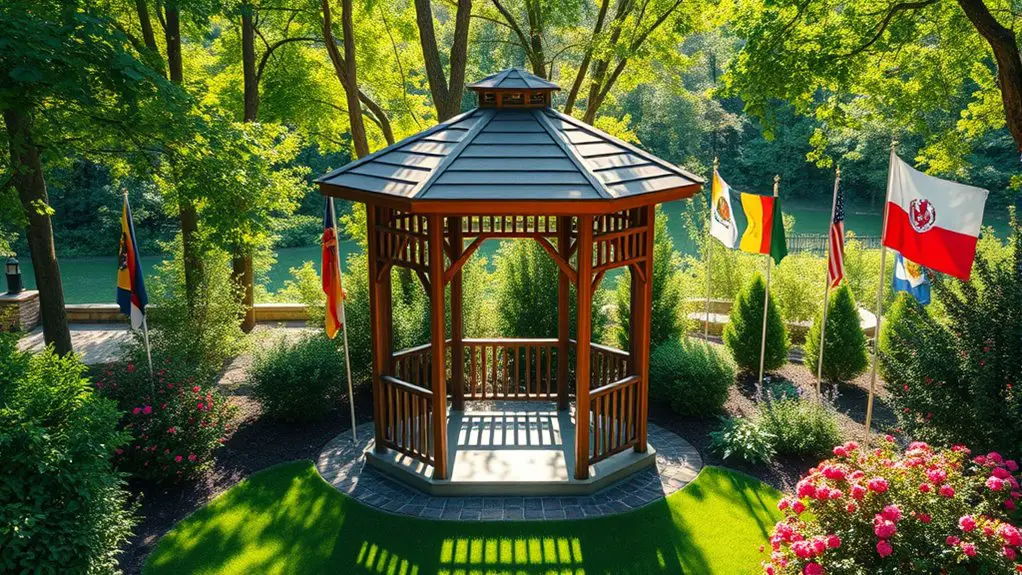You need to check local permit requirements before building a gazebo, as they vary markedly by state. Some regions may not require a permit for smaller structures, while larger designs typically do. Zoning laws and the distance from property lines can also influence exemptions. Understanding these regulations is vital to avoid potential fines or having to dismantle your gazebo. Keep going to discover detailed guidelines and tips for a smoother construction experience.
Understanding Permits: What You Need to Know
When it comes to building a gazebo, do you really understand the permit requirements? Knowing the different permit types is vital before you start your project. Typically, you’ll encounter building permits, zoning permits, and possibly landscaping permits, depending on your local construction regulations. Each type serves a specific purpose, ensuring safety and compliance with local laws. It’s important to research your area’s requirements, as failing to obtain the necessary permits can lead to fines or even having to dismantle your gazebo. Understanding these regulations not only helps you avoid legal issues but also empowers you to create a beautiful space without unnecessary interruptions. Fundamentally, proper knowledge of permit types is the first step toward achieving your gazebo-building dreams. Additionally, familiarizing yourself with local regulations can significantly impact your project’s success.
Permitting Requirements by State
Although permit requirements can vary greatly from one state to another, understanding your local regulations is vital before starting your gazebo project. Many states impose specific regulations regarding gazebo sizes, often influenced by zoning laws and property lines. For instance, some states may allow smaller structures to be built without a permit, while larger designs might require one. It’s important to check with your local planning department to determine what’s applicable in your area. Additionally, some states have stricter guidelines concerning building materials and construction methods. By familiarizing yourself with these state regulations, you can guarantee your gazebo project aligns with the law, allowing you to enjoy your space freely without future complications.
Common Exceptions and Exemptions
Understanding local regulations is important, but it’s equally essential to be aware of common exceptions and exemptions that may apply to your gazebo project. Many areas classify certain structures as exempt structures, meaning they don’t require permits. This often includes small, temporary, or detached structures that meet specific size and height requirements. Additionally, if your gazebo is situated a certain distance from property lines, it might be exempt. However, these rules vary widely by location. Always check with your local regulations, as exemptions can greatly impact your project timeline and costs. Knowing these details can save you from unnecessary complications and guarantee that you exercise your freedom to create without red tape.
How to Apply for a Permit
Applying for a permit can seem intimidating, yet breaking the process down into manageable steps can simplify it considerably. First, research your local regulations to understand the specific requirements for your gazebo. Next, gather the required documents, which typically include site plans, building specifications, and proof of property ownership. Completing the application process may involve filling out forms online or in person, depending on your jurisdiction. Once submitted, be prepared for possible inspections or additional requests for information. Always keep communication lines open with the permitting office to clarify any uncertainties. This proactive approach guarantees you’re well-prepared, ultimately allowing you to focus on enjoying your new gazebo without unexpected delays.
Tips for a Smooth Construction Process
Once you’ve secured your permit, the next step is to confirm a smooth construction process for your gazebo. Start with careful site selection; make sure it’s level, accessible, and compliant with local regulations. Consider the sunlight, shade, and wind patterns in your chosen location to maximize comfort. Next, choose high-quality construction materials that align with your design and climate. Durable wood, weather-resistant finishes, and sturdy hardware will enhance longevity. Organize your timeline and gather all necessary tools before beginning. Effective communication with any contractors or helpers is essential, so clearly define roles and expectations. Finally, keep your work area tidy to minimize hazards and maintain efficiency. By following these tips, you’ll create a successful and enjoyable gazebo building experience. Additionally, ensure you properly secure the gazebo with anchors to prevent damage from strong winds.
Frequently Asked Questions
How Long Does It Take to Get a Permit Approved?
The approval timeline for permits varies widely based on location, typically ranging from a few days to several weeks. Factors like permit processing times and local regulations can greatly influence this duration, so plan accordingly.
Are There Fees Associated With Obtaining a Permit?
You might think permits are just a hassle, but understanding permit costs and application fees can save you money in the long run. It’s essential to factor these expenses into your overall project budget.
Can I Build a Gazebo Without a Permit in Emergencies?
In emergencies, you might be able to build temporary structures without a permit, depending on local emergency regulations. However, check your area’s specific rules to verify compliance and avoid potential fines or legal issues.
What Happens if I Build Without a Permit?
If you build without a permit, you might face dire consequences of noncompliance, potentially resulting in hefty fines and legal ramifications. It’s essential to understand the risks before diving into your construction project.
Can I Appeal a Permit Denial?
Yes, you can appeal a permit denial. Understand the permit appeal process, focusing on valid reasons for denial. Gathering evidence and addressing concerns can strengthen your case, potentially leading to a successful outcome.

